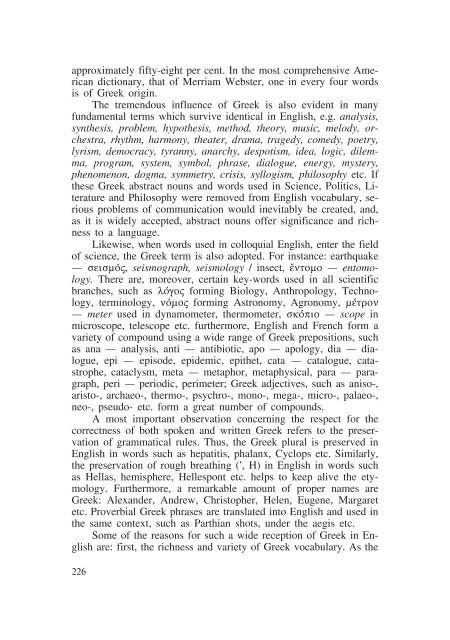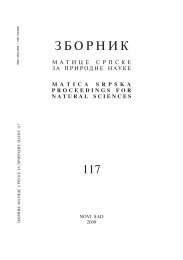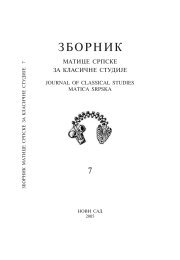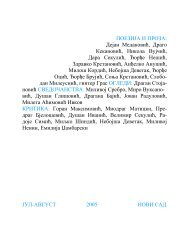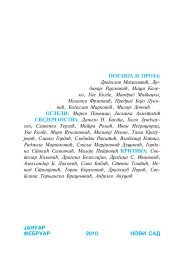You also want an ePaper? Increase the reach of your titles
YUMPU automatically turns print PDFs into web optimized ePapers that Google loves.
approximately fifty-eight per cent. In the most comprehensive American<br />
dictionary, that of Merriam Webster, one in every four words<br />
is of Greek origin.<br />
The tremendous influence of Greek is also evident in many<br />
fundamental terms which survive identical in English, e.g. analysis,<br />
synthesis, problem, hypothesis, method, theory, music, melody, orchestra,<br />
rhythm, harmony, theater, drama, tragedy, comedy, poetry,<br />
lyrism, democracy, tyranny, anarchy, despotism, idea, logic, dilemma,<br />
program, system, symbol, phrase, dialogue, energy, mystery,<br />
phenomenon, dogma, symmetry, crisis, syllogism, philosophy etc. If<br />
these Greek abstract nouns and words used in Science, Politics, Literature<br />
and Philosophy were removed from English vocabulary, serious<br />
problems of communication would inevitably be created, and,<br />
as it is widely accepted, abstract nouns offer significance and richness<br />
to a language.<br />
Likewise, when words used in colloquial English, enter the field<br />
of science, the Greek term is also adopted. For instance: earthquake<br />
— seismÃj, seismograph, seismology / insect, ¿ntomo — entomology.<br />
There are, moreover, certain key-words used in all scientific<br />
branches, such as lÃgoj forming Biology, Anthropology, Technology,<br />
terminology, nÃmoj forming Astronomy, Agronomy, mçtron<br />
— meter used in dynamometer, thermometer, skÃpio — scope in<br />
microscope, telescope etc. furthermore, English and French form a<br />
variety of compound using a wide range of Greek prepositions, such<br />
as ana — analysis, anti — antibiotic, apo — apology, dia — dialogue,<br />
epi — episode, epidemic, epithet, cata — catalogue, catastrophe,<br />
cataclysm, meta — metaphor, metaphysical, para — paragraph,<br />
peri — periodic, perimeter; Greek adjectives, such as aniso-,<br />
aristo-, archaeo-, thermo-, psychro-, mono-, mega-, micro-, palaeo-,<br />
neo-, pseudo- etc. form a great number of compounds.<br />
A most important observation concerning the respect for the<br />
correctness of both spoken and written Greek refers to the preservation<br />
of grammatical rules. Thus, the Greek plural is preserved in<br />
English in words such as hepatitis, phalanx, Cyclops etc. Similarly,<br />
the preservation of rough breathing (=, H) in English in words such<br />
as Hellas, hemisphere, Hellespont etc. helps to keep alive the etymology.<br />
Furthermore, a remarkable amount of proper names are<br />
Greek: Alexander, Andrew, Christopher, Helen, Eugene, Margaret<br />
etc. Proverbial Greek phrases are translated into English and used in<br />
the same context, such as Parthian shots, under the aegis etc.<br />
Some of the reasons for such a wide reception of Greek in English<br />
are: first, the richness and variety of Greek vocabulary. As the<br />
226


